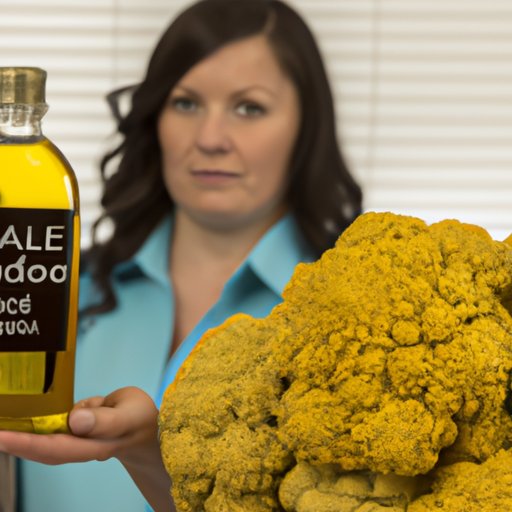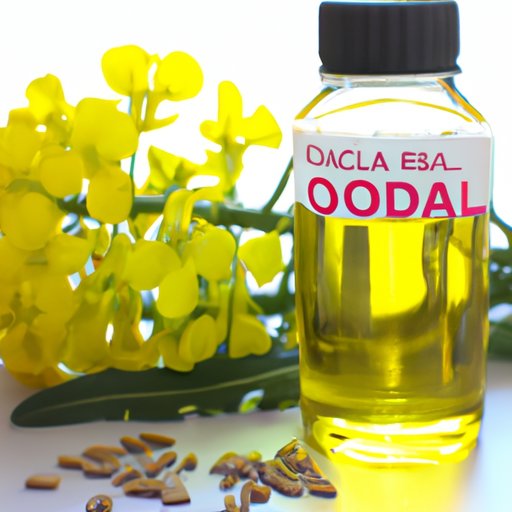Introduction
Canola oil has become one of the most popular cooking oils in North America and around the world. But is it really healthy? This article explores the potential health benefits and risks of canola oil, as well as its environmental impact. We’ll look at ways to incorporate it into a healthy diet and examine the truth behind common myths about this popular cooking oil.
Examining the Nutritional Benefits of Canola Oil
Canola oil is made from a type of rapeseed plant. It contains a variety of nutrients and vitamins, including omega-3 and omega-6 fatty acids, vitamin E, and magnesium. According to a study published in the journal Nutrition Reviews, canola oil is “rich in monounsaturated fat, which may help reduce low-density lipoprotein cholesterol levels and provide other cardiovascular benefits.”
The same study also found that canola oil provides several health benefits, such as reducing inflammation, improving insulin sensitivity, and helping with weight management. Additionally, the high levels of antioxidants present in canola oil have been linked to a decreased risk of certain cancers, such as prostate cancer.

Exploring the Research on Potential Risks of Canola Oil
Despite the numerous potential health benefits of canola oil, there is some controversy surrounding its use. Some research suggests that canola oil may have negative affects on health, such as increasing the risk of oxidative stress and inflammation. A study published in the journal Food and Chemical Toxicology found that consuming large amounts of canola oil could lead to an increased risk of liver damage.
However, the findings of this study have been disputed by other researchers who argue that the results were inconclusive. As the authors of a review published in the journal Nutrition Reviews note, “there is no clear evidence that canola oil consumption leads to adverse health effects.”
Comparing Canola Oil to Other Cooking Oils
When it comes to choosing a cooking oil, it’s important to consider the fat content and composition. Canola oil is relatively low in saturated fat and high in monounsaturated fat, making it a healthier alternative to other cooking oils such as butter or lard. It also has a relatively high smoke point, making it suitable for higher temperature cooking.
Olive oil is another popular cooking oil. It is high in monounsaturated fat and antioxidants, but it has a lower smoke point than canola oil, making it better suited to lower temperature cooking. Coconut oil is another option, but it is high in saturated fat and should be used sparingly.
Investigating the Environmental Impact of Canola Oil Production
It is important to consider the environmental impact of canola oil production when evaluating its health benefits. Canola oil production involves the use of large amounts of water and energy, as well as the use of pesticides and fertilizers. The pesticides used in canola production can contaminate local water sources, while the fertilizers can lead to soil erosion and air pollution.
Additionally, the production of canola oil often involves genetic engineering, which can have a negative impact on the environment. According to a study published in the journal PLOS One, genetically modified crops are more likely to require more pesticides and fertilizers, leading to a greater environmental impact.

Looking at Ways to Incorporate Canola Oil into a Healthy Diet
Although there are potential risks associated with canola oil production, it is still possible to incorporate it into a healthy diet. Canola oil can be used for baking, sautéing, stir-frying, and as a dressing for salads. It can also be used as a substitute for butter in recipes. Additionally, there are a variety of recipes that incorporate canola oil, such as roasted vegetables, muffins, and cakes.

Examining the Health Claims of Canola Oil
In recent years, there have been many claims made about the health benefits of canola oil. Some of these claims include that canola oil can reduce cholesterol, improve heart health, and even prevent cancer. However, the majority of these claims are unsupported by scientific evidence.
A review published in the journal Critical Reviews in Food Science and Nutrition found that, while there may be some potential health benefits associated with canola oil, the “overall body of evidence does not support the promotion of canola oil as a health food.”
Conclusion
Canola oil has become a popular cooking oil in recent years, but is it really healthy? This article explored the potential health benefits and risks of canola oil, as well as its environmental impact. We looked at how to incorporate it into a healthy diet and examined the truth behind common myths about this popular cooking oil.
Overall, the evidence suggests that canola oil can be a healthy part of a balanced diet. However, it is important to remember that any food consumed in excess can be detrimental to your health. Therefore, it is best to enjoy canola oil in moderation and to choose organic, non-genetically modified varieties whenever possible.
(Note: Is this article not meeting your expectations? Do you have knowledge or insights to share? Unlock new opportunities and expand your reach by joining our authors team. Click Registration to join us and share your expertise with our readers.)
